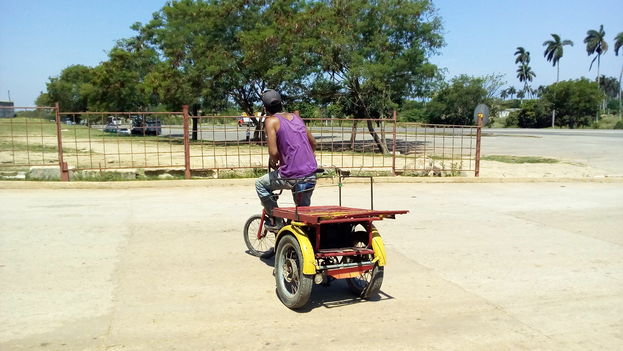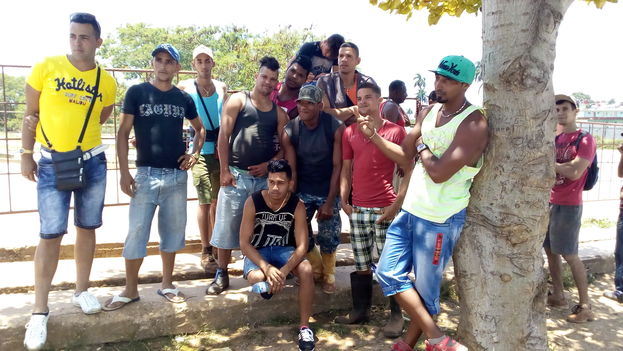
![]() 14ymedio, Luz Escobar, Havana, 14 May 2016 — The line of trucks extends along the embankment that provides access to the only wholesale agricultural market in Havana. But unlike other days, the farmers who have come with their merchandise neither unload it nor sell it. The place is surrounded by police and someone is passing out a flyer confirming the announcement on TV primetime news: El Trigal market has closed.
14ymedio, Luz Escobar, Havana, 14 May 2016 — The line of trucks extends along the embankment that provides access to the only wholesale agricultural market in Havana. But unlike other days, the farmers who have come with their merchandise neither unload it nor sell it. The place is surrounded by police and someone is passing out a flyer confirming the announcement on TV primetime news: El Trigal market has closed.
Many of those who congregated this Friday in front of the access to large space hadn’t heard the “bad news.” They came with their boxes and sacks loaded with farm products and found the employees as surprised as they were over the suspension of sales in the 292 spaces where, until a few hours ago, beans, onions, avocados and other fruits and vegetables were for sale.
The driver of a truck loaded with mangos almost begged the custodians of El Trigal to let him sell his merchandise. “I came from Santiago de Cuba and now the whole trip is wasted,” complained the man. “I’m a farmer,” he clarified, to avoid being labeled an “intermediary.” An inspector warned him that if he stayed in the vicinity he would be fined and his product would be confiscated.
After noon the place is a beehive of dissatisfaction and complaints. “Boris Fuentes, the wine writer for Cuba Dice was here,” said one of the carters, a man who until Thursday made a living carrying merchandise from the trucks to the stalls and pallets. The young man recalled when an official reporter wanted to record a program about the high prices of food in a market conceived to lower the cost of basic food supplies.
“People insulted him and asked him why he didn’t do a story about the high prices in the [officially-named] Hard Currency Collection Stores run by the State,” said a carter. A few yards away, Diosbel Castro Rodriguez, 24, can’t quite believe he has lost the job that supports his family. “As long as I work and can feed my family everything is fine. But I have two kids and now without work I can’t stop thinking about what I can do,” insinuates the man.
Rodriguez Castro repeated the claim of many others in El Trigal: “They can’t do this from one day to the next, they have to give us some time, so we can look for other work,” he laments.
Yerandy Diaz, a resident of Fortuna, believes that it was on purpose that the place was closed without any notice to users and facility workers so they “did not have time for anything, for protests or to go anywhere.” According to him, the president of the cooperative that managed the market, Carlos Sablon Sosa, was called to an emergency meeting late on Thursday afternoon.

While Sablon Sosa was in the meeting a group of inspectors showed up and passed out a paper confirming the closure. “They came here with two police cars to intimidate people and make sure there wasn’t any hassle,” recalls Yerandy Diaz.
Working in the place were 66 carters who paid license fees to exercise their occupation, more than 30 vendors and a hundred people in the dining areas, and “over a thousand peasants who come here to sell every week,” said Diaz. All have been perplexed by the government’s decision to suspend sales.
“We have officially become unemployed, up in the air, they have not given us another alternative work,” Diaz complains facing the police as tempers begin to flare. The young man criticizes the lack of transparency because the TV news reported it was being closed “for illegalities but they didn’t detail them.”
The line of trucks continues to grow, spending hours in front of the door of El Trigal trying to convince the inspectors and the police that “at least give us one last chance to sell what we already brought here,” but authorities do not give in.
Yorenny Cobas, a resident of Fortuna, was carter at El Trigal and explains that he worked moving the product from one place to another. “We charge for the service at the time we provide it, depending on the load, it can be 10, 15 or 20 Cuban pesos; we pay for a license that costs 200 pesos a month, plus more than 87 pesos for social security and 60 pesos a day every time we work, for renting the cooperative’s truck.”
The carter, without much hope, questions an inspector. “Do you know how many families are now left with nothing?” He considers that what happened with El Trigal will bring out “more illegalities” because the farmers “will try to bring the merchandise and sell it.”
The evening falls and El Trigal remains closed, there is another police car and on the market access road a farmer tries, at a whisper, to sell his mangoes at a liquidation price.
